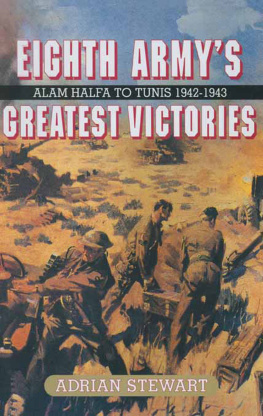First published in Great Britain in 2011 by
Pen & Sword Military
an imprint of
Pen & Sword Books Ltd
47 Church Street
Barnsley
South Yorkshire
S70 2AS
Copyright Adrian Stewart, 2011
9781783031153
The right of Adrian Stewart to be identified as the
author of this work has been asserted by him in accordance
with the Copyright, Designs and Patents Act 1988
A CIP catalogue record for this book is
available from the British Library
All rights reserved. No part of this book may be reproduced or transmitted in any form or by any means, electronic or mechanical including photocopying, recording or by any information storage and retrieval system, without permission from the Publisher in writing.
Typeset in Ehrhardt by Chic Media Ltd
Printed and bound in England
by CPI
Pen & Sword Books Ltd incorporates the imprints of
Pen & Sword Aviation, Pen & Sword Maritime,
Pen & Sword Military, Pen & Sword Family History,
Wharncliffe Local History, Wharncliffe True Crime,
Wharncliffe Transport, Pen & Sword Discovery, Pen & Sword Select,
Pen & Sword Military Classics, Leo Cooper, Remember When,
The Praetorian Press, Seaforth Publishing and Frontline Publishing
For a complete list of Pen & Sword titles please contact
PEN & SWORD BOOKS LIMITED
47 Church Street, Barnsley, South Yorkshire, S70 2AS, England
E-mail: enquiries@pen-and-sword.co.uk
Website: www.pen-and-sword.co.uk
Chapter 1
Master and Pupils
I n August 1942, an encyclopaedia called The New Book of Knowledge produced an extra volume entitled War Supplement . Among its 1,270 articles was one that dealt briefly with an officer who had shown immense skill and resolution during the harrowing retreat to Dunkirk and subsequently won deserved praise for his thorough and realistic training methods, yet was still virtually unknown outside his own profession. It read as follows:
Montgomery, Lt-Gen Bernard Law CB, DSO, (b 1887). He was appointed GOC-in-C, South Eastern Command in November 1941, in succession to Lt-Gen Paget. From 1938 to 1940, when he became specially employed, he was a Divisional Commander.
There would be a different story when Supplement 2 of the encyclopaedia came out in 1947. Its frontispiece would be a painting of Montgomery, he would be mentioned in many of its 1,900 articles and appear on the photographs accompanying them, and the article dealing specifically with him would run to a full two-column page, followed by half a page of illustrations bearing the general caption: From Alamein to Germany He Led the Empires Men.
It was an appropriate reminder not only of Montgomerys immense achievements but of the debt that he owed to the soldiers who had followed him and fought his battles. This, to his credit, he was always quick to acknowledge, declaring of his Eighth Army: My only fear was that I myself might fail these magnificent men; and of his Twenty-First Army Group: Few commanders can have had such loyal service.
Montgomery discharged his debt by the care he lavished on those under his command. On taking over Eighth Army, he cancelled orders preventing nursing sisters being brought up to the forward areas, explaining, with typical bluntness, that the wounded then knew they would be properly nursed. No male nursing orderly can nurse like a woman, though many think they can. He arranged for dentists chairs to be landed over the Normandy beaches, so that the mens teeth could be checked regularly. Throughout the campaigns in North-West Europe, he demanded that every soldier must have at least one hot meal a day, and strongly, if no doubt tactlessly, urged his American allies to follow his example. He took all possible precautions that might reduce casualties, and ignored any political or military superior who wanted him to act before his preparations were complete; his attitude would lead to his being accused of over-caution, but not by those whose lives it would save.
Nor was Montgomerys concern inspired solely by a prudent reflection that his troops would fight better if they were well looked after, as is the impression given by some other successful commanders. Alan Moorehead, the Australian War Correspondent, states in his book Eclipse that Montgomery treated his army as a kind of family. He delighted in being with the soldiers and he drove among them for hours every day. Montgomery himself in his Memoirs calls the British soldier my friend and comrade in arms and would build up a partnership with his men, based on mutual respect and trust.
Yet it is often forgotten that there was a third member of this partnership: a group of exceptionally able officers, both on the staff and in the field, who formed the link between the general and his soldiers. They were deservedly liked and admired by their juniors and the men in the ranks for the example they provided, for the efficiency with which they carried out their duties, and for the loyal support that they gave to the common cause. Their merits were equally recognized by Montgomery, who gave them his confidence and did his best to further their careers. For their part, his chosen officers regarded themselves as not only his subordinates but also his pupils and were committed to following and passing on to others the precepts he had taught. They would continue to do so even when serving well away from his immediate control; they thereby extended still further the enormous contribution that Montgomery would make towards the winning of the Second World War.
As representatives of the officers and men who followed and were inspired by Montgomery, it is proposed to examine the careers of six of these chosen subordinates. They differed widely in character, background, the branches of the Army from which they came and the tasks that they performed during Montgomerys campaigns and elsewhere. Yet all of them played crucial roles during those latter months of 1942 when the tide turned; the moment that Prime Minister Winston Churchill would call The Hinge of Fate, and after which, as General Sir David Fraser would declare in And We Shall Shock Them; The British Army in the Second World War , the previously unknown general dominated the collective consciousness of that Army; the moment when Montgomery, Lt-Gen Bernard Law became Monty.























